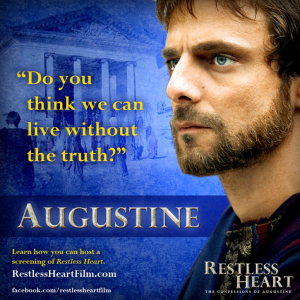To reflect on Aristotle’s great maxim: “The unexamined life isn’t worth living” by discussing philosophy, faith and science. Dedicated to my favorite heroes of philosophy: St Augustine and Aristotle
-
Subscribe
Subscribed
Already have a WordPress.com account? Log in now.

Joe–I found the site. Looks great. Can’t wait to start reading! Doug
LikeLike
Welcome Doug! Don’t forget to share the blog with othrs
LikeLike
Interesting blog, Joe. I look forward to reading more.
LikeLike
Joe,
I listened to this interview of David Berlinski today and thought of your blog even before Berlinski referenced Augustine. I think you would enjoy it.
http://www.hoover.org/multimedia/uncommon-knowledge/168526
Matt
LikeLike
Hi there! Just found your blog and look forward to reading it. I enjoyed your review of Restless Heart. Did you already give away the copy you offered to the first person to contact you? I assume you have, but figured I’d ask. I would love to write a review of the film after watching at home (I saw it in the theater and overall very much liked it).
LikeLike
Hi Elena! Welcome to the blog! I’m not surprised that “Restless Heart” has moved you to want to write about it. Unfortunately, I did give away the free copy. However, I will be looking to address Restless Heart again in August in celebration of St Augustine’s feast day. Would you be interested in submitting a guest blog Restless Heart review for then? BTW, when you saw it at home did you see the long version? It’s a better movie.
LikeLike
#Reasons to Believe in Jesus
Reasons to believe Jesus is alive in a new life with God can be found in quotes from two prominent atheists and a biology textbook.
> Thus the passion of man is the reverse of that of Christ, for man loses himself as man in order that God may be born. But the idea of God is contradictory and we lose ourselves in vain. Man is a useless passion. (Jean-Paul Sartre, Being and Nothingness: A Phenomenological Essay on Ontology, New York: Washington Square Press, p. 784)
> Among the traditional candidates for comprehensive understanding of the relation of mind to the physical world, I believe the weight of evidence favors some from of neutral monism over the traditional alternatives of materialism, idealism, and dualism. (Thomas Nagel, Mind and Cosmos: Why the Materialist Neo-Darwinian Conception of Nature Is Almost Certainly False, location 69 of 1831)
> And certain properties of the human brain distinguish our species from all other animals. The human brain is, after all, the only known collection of matter that tries to understand itself. To most biologists, the brain and the mind are one and the same; understand how the brain is organized and how it works, and we’ll understand such mindful functions as abstract thought and feelings. Some philosophers are less comfortable with this mechanistic view of mind, finding Descartes’ concept of a mind-body duality more attractive. (Neil Campbell, Biology, 4th edition, p. 776 )
Sartre speaks of the “passion of man,” not the passion of Christians. He is acknowledging that all religions east and west believe there is a transcendental reality and that perfect fulfillment comes from being united with this reality after we die. He then defines this passion with a reference to Christian doctrine which means he is acknowledging the historical reasons for believing in Jesus. He does not deny God exists. He is only saying the concept of God is contradictory. He then admits that since life ends in the grave, it has no meaning.
From the title of the book, you can see that Nagel understands that humans are embodied sprits and that the humans soul is spiritual. He says, however, that dualism and idealism are “traditional” alternatives to materialism. Dualism and idealism are just bright ideas from Descartes and Berkeley. The traditional alternative to materialism is monism. According to Thomas Aquinas unity is the transcendental property of being. Campbell does not even grasp the concept of monism. The only theories he grasps are dualism and materialism.
If all atheists were like Sartre, it would be an obstacle to faith. An important reason to believe in Jesus is that practically all atheists are like Nagel and Campbell, not like Sartre.
by David Roemer
347-417-4703
http://www.newevangelization.info
LikeLike